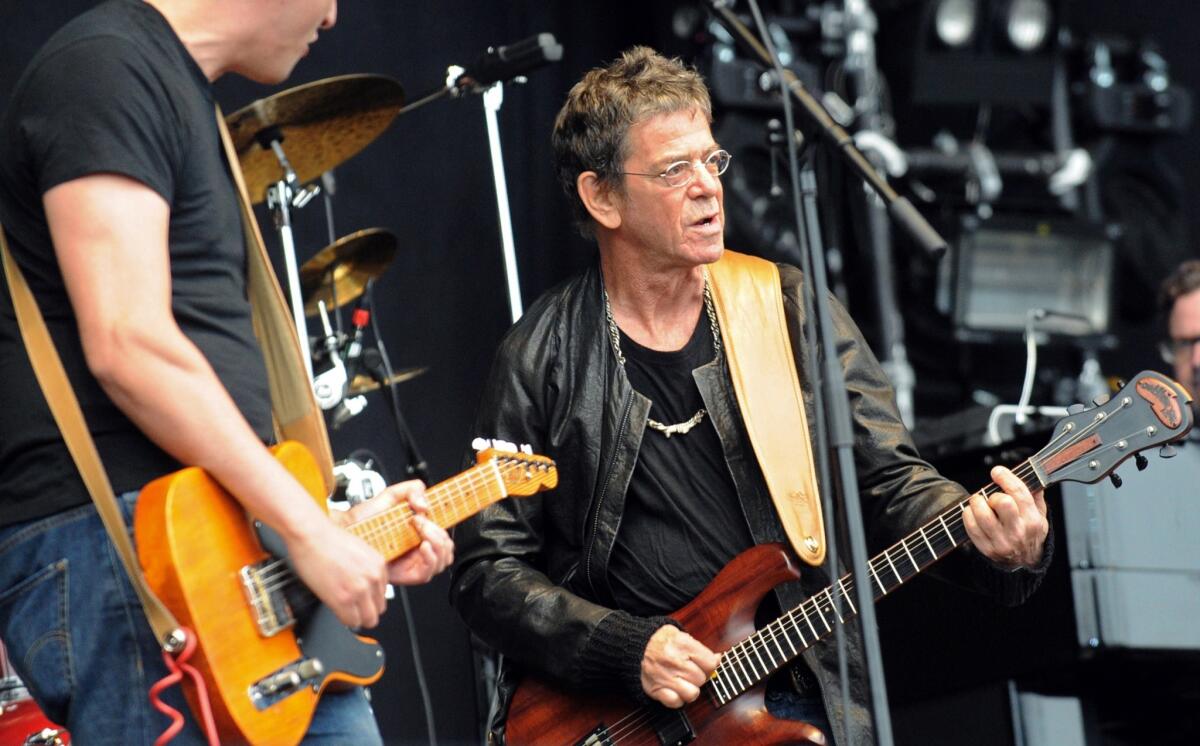Memories of Lou Reed: Pizza, vinyl and UCLA

- Share via
There was no shortage of recording of rock, pop and R&B music going on in New York in the 1960s, but as a recognizable music scene, New York definitely held a lower profile than those of Los Angeles, San Francisco, London, Detroit, Memphis and a few others we might mention.
That’s an aspect of Lou Reed’s influence that came to mind for Grammy Museum executive director Robert Santelli on Sunday after news of the death of the influential songwriter, singer and bandleader who first came to fame with the Velvet Underground broke and quickly reverberated through the music community.
“One interesting thing about the Velvet Underground is that at a time when so much attention was being paid to what was going on on the West Coast--rightfully so--and in swinging London, there was an incredible scene going on in New York City, at the center of which was the Velvet Underground and Lou Reed.
“They were approaching an area of avant-garde art, with the whole connection to [Andy] Warhol, in a way that was completely unique,” he said. “Lou also had a grand solo career, and was always someone who was very much a representative of the New York rock scene and the New York art scene. People of the likes of Patti Smith on down have long looked at Lou as a visionary and a source of inspiration.”
Many of the stories about Reed’s passing noted his famous observation that the Velvets would have none of the conventional rock and R&B licks that permeated so much of the music of the era. “This is going to be urban,” he said.
Santelli also recalled another key component of urban life in New York of which Reed was an avid enthusiast: pizza.
Reed had been booked to play the Bumbershoot Festival near Seattle, and asked Santelli, who was then director of Experience Music Project museum in Seattle, if he could rehearse his band ahead of their performance.
“Of course I told him we’d be thrilled and honored for him to rehearse at EMP,” Santelli said Sunday. At the end of each work day while Reed and his band were woodshedding their material, Santelli would stop in to listen and ask how everything was going.
Santelli, who grew up in New Jersey, said, “New York and New Jersey are probably the two places most famous for pizza, especially Ray’s, and one thing he’d always mention when we talked was how good the pizza was at the EMP restaurant. I said, ‘Lou, it’s not that good--you’re from New York, you know great pizza.’ But he’d eat one or two pieces every day.”
That’s one anecdote that underscores the complexities of the man whose life and contributions to the music world are being celebrated.
Two others cropped up for me, both of which illustrate his passion for all aspects of the projects he took on, and his commitment to seeing them executed properly.
One of my colleagues was scheduled to interview Reed many years ago about the new album he was putting out at the time—which one now escapes me.
The relevant point is that the record company had dutifully sent the writer an advance cassette of the album, back in the pre-CD days, for him to listen to in preparation for the interview.
When Reed and the writer sat down, Lou asked “Have you heard the album?” and the writer responded, “Yes, the label sent me the advance cassette.”
Reed exploded. “What?! No, we can’t do an interview. They sent you the cassette? No, you have to hear the vinyl before we can talk.” And he rescheduled the interview until the label sent the album on his preferred playback format.
I’ve also never forgotten the surreal aspect of a Reed performance I saw in 1991 at UCLA. There was a parallel universe quality of the image of him walking on stage at the university’s Wadsworth Theater. He appeared not with an electric guitar to thrash and a rock band to accompany him, but instead strolled out, a notebook under his arm, and stopped behind a lectern equipped with a microphone and reading lamp.
To his right was a stool on which sat a bottle of Evian water from which he took a polite sip before slipping on his reading glasses, opening the notebook and meticulously started reciting his song lyrics and poetry.
Words were important to Reed, more important than any considerations of singing technique, which was charmingly dubious throughout his career.
Many of his songs were more spoken than sung anyway, so the recitation was somehow fitting, however incongruous it seemed in the academic surroundings.
It left such an impression that after the show I went to a shop and had a couple of custom T-shirts made to commemorate the performance, one for me, one for my editor at the time who was a dyed-in-the-wool Lou Reed and Velvet Underground fan.
They bore four words: “I Saw Lou Read.”
ALSO:
Lou Reed put the underground front and center
Lou Reed dies at 71; rock giant led Velvet Underground
Lou Reed dies; rock critic Robert Hilburn remembers ‘warmest guy’
Follow Randy Lewis on Twitter: @RandyLewis2
More to Read
The biggest entertainment stories
Get our big stories about Hollywood, film, television, music, arts, culture and more right in your inbox as soon as they publish.
You may occasionally receive promotional content from the Los Angeles Times.










